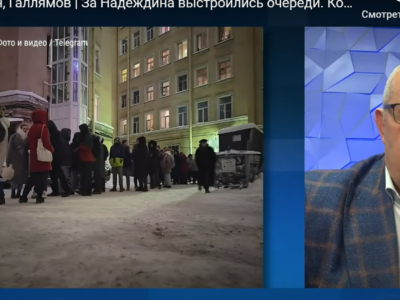Stories about Censorship
Presidential election in Azerbaijan show old habits die hard
This election was business as usual in Azerbaijan with manipulation and violations, including carousel voting, ballot stuffing, and aggressive behavior toward independent observers and journalists throughout the day.
The Baku Connection: Journalists across the world unite to support Azerbaijan's Abzas Media
Some 40 journalists from 15 media outlets have joined the project since its launch as Abzas Media team who started the investigations, await trial in Baku.
Hundreds of thousands supported anti-war candidate in Russia but he was banned from elections
Boris Nadezhdin and Yekaterina Duntsova happened to be the main figures of the Russian elections in March 2024, although neither of them are going to be on the ballot
Azerbaijan: Competition-free vote to settle Aliyev’s grip on power
"Each round of flawed elections was a lost opportunity for Azerbaijan to step away from post-Soviet autocracy towards democracy."
A platform tries to map the reduction of artistic freedom in Brazil
The idea arose following the boycott and closure of the Queermuseu exhibition in 2017 in Porto Alegrel. On social networks, conservative groups protested against the exhibition.
The Suriname book prohibition in a global context of free expression
Suriname's book ban on corruption exposure is more than a local issue; it's a global wake-up call for the defence of free speech and press freedom against authoritarianism.
Portraits of exile: Musical resistance to oppression from Iranian singer Faravaz
Faravaz defied borders and societal norms, moving from early recognition in Iran to facing backlash, exile, and activism in Germany. Her journey is a testament to the resilience of Iranian women against oppression.
In Kazakhstan, ‘Bloody January’ is still a taboo topic
"The authorities do not need to dwell on this topic, because why would they? They killed people, tortured them — why [would they revisit this]?"
Hong Kong kickstarts local national security law legislation with explaining and rebuttal teams
Chief Executive John Lee: Hostile forces would engage in propaganda work, especially online, to smear and distort the legislation.
National broadcaster axes Australian journalist Antoinette Lattouf over Gaza social media post
"Does anyone think an ABC reporter would have been sacked for posting a message on social media supporting Israel?"
In Azerbaijan, the stakes are always high for political activists
A few weeks after the announcement of a new social activism platform, its founder, Aliyev went missing on December 23.
Russian series on Perestroika-era youth gangs breaks popularity records, defying attempts to ban it
Russian streaming services premiered the series "Slovo Patsana. Krov’ na asphalte" (The Boy’s Word: Blood on the Asphalt). Within just a month, it was breaking popularity records in Russia.
Terrorists from Tajikistan have become a global menace
Over the last decade, Tajikistan’s foreign terrorist fighters (FTFs) have brought their homeland under a negative limelight on numerous occasions.
Navigating Rwanda's media landscape ahead of the upcoming election
Reporters Without Borders attributes Rwanda's low ranking to the censorship faced by the media, where journalists are compelled to pledge allegiance to the government and participate in patriotism programs.
Indonesian candidates urged to address human rights concerns
"Indonesia continues to fail to guarantee people’s rights to express their opinions peacefully amidst a shrinking civic space."
Belarusians returning home from immigration receive criminal charges
Human rights defenders say that despite the "agreements," criminal cases were initiated against people who believed the authorities and returned to Belarus.
Documentary about the protest of soldiers’ wives, sisters and mothers created in Russia
Women demanding 'demobilisation' say: "Our topic, it's kind of forbidden. Do you understand? I'm scared to say what I think. I'm scared that I might never see my husband again."
Man jailed for three months for wearing ‘seditious’ shirt with protest slogan at Hong Kong airport
A Hong Kong man was arrested near a boarding gate at the HK International Airport last November after he was seen wearing a t-shirt with a protest slogan printed on it.
In the shadows of self-censorship: The impact of the Cyber Security Act on Bangladesh’s LGBTQ+ movement
Several sections of the newly enacted Cyber Security Act (CSA) restrict the advocacy and movement for LGBTQ+ rights, criminalising published contents highlighting injustices faced by the LGBTQ+ community in Bangladesh.
‘Eternal president’ and transitionary motive in Azerbaijan’s snap election
Alongside repressions, or as a result of it, Azerbaijani leadership has over the past thirty years managed to acquire the passive acquiescence of different generations of the population.
Turkey bans access to 16 VPN providers
Pundits say, the goal of the recent ban is to prevent access to already blocked news websites in the country that were only accessible with VPN services.
























